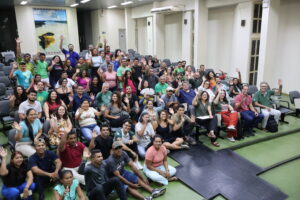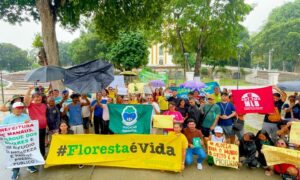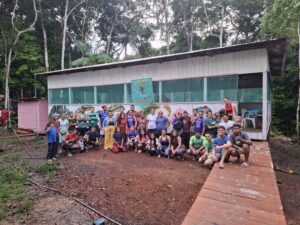The training empowered 24 women who are now capable of being part of counting teams in their communities in the mid-juruá
By Simelvia Vida and Clara Machado
Translated by Laiane Lessa
On September 16ᵗʰ to 18ᵗʰ, 2023, the third edition of the exclusive course for women about counting methodology as monitoring tool for arapaima (Arapaima gigas) took place. The training occurred in the Lago Serrado community, located in the fishing agreement area of Mid-Juruá, in Carauari (Amazonas, Brazil).
Historically, training for the arapaima counting stage, which is essential in the activity of sustainable management, has always been a domain of men, with little or no female participation. In this context, the course centered on women, in its third edition in Mid-Juruá aims to repair this inequality.
The participation of women in arapaima management generates unprecedented income for women in the fishing production chain, providing autonomy, self-esteem, and reducing historically built gender inequality.
Women have always been involved in various aspects of fishering management during the fishing season, such as fish evisceration and food preparation for the team. However, other stages were seen as ‘male’ tasks. The course also makes them capable of participating in the pre-fishing stage, which is the arapaima counting in the environments. This is the stage that Ibama (Brazilian Institute of Environment and Renewable Natural Resources) uses to determine the fish quota to be caught in the following year.
Twenty-five women participated in this training, aiming to strengthen the communitarian management in the region and create a space where they feel comfortable to learn the methodology and assist with counting teams from their communities.
“For me, it was a huge satisfaction, another opportunity for us women who live in the midst of sexism. Men tend to think that we are not capable of doing what they do.This course was very important to me”, says Maria Silvilene, a new arapaima counter and a resident of São João community.
The course opening began with a lecture on women’s health, offered in partnership with the Health Department of Carauari Municipality in conjunction with the Mid-Juruá Benefit Sharing (RBMJ) and Association of Agro Extractive Residents of the Lower Mid-Juruá (AMAB). The participants were allowed to ask questions about women’s health, and after the lecture, consultation was provided by nurse Keisy Marques.

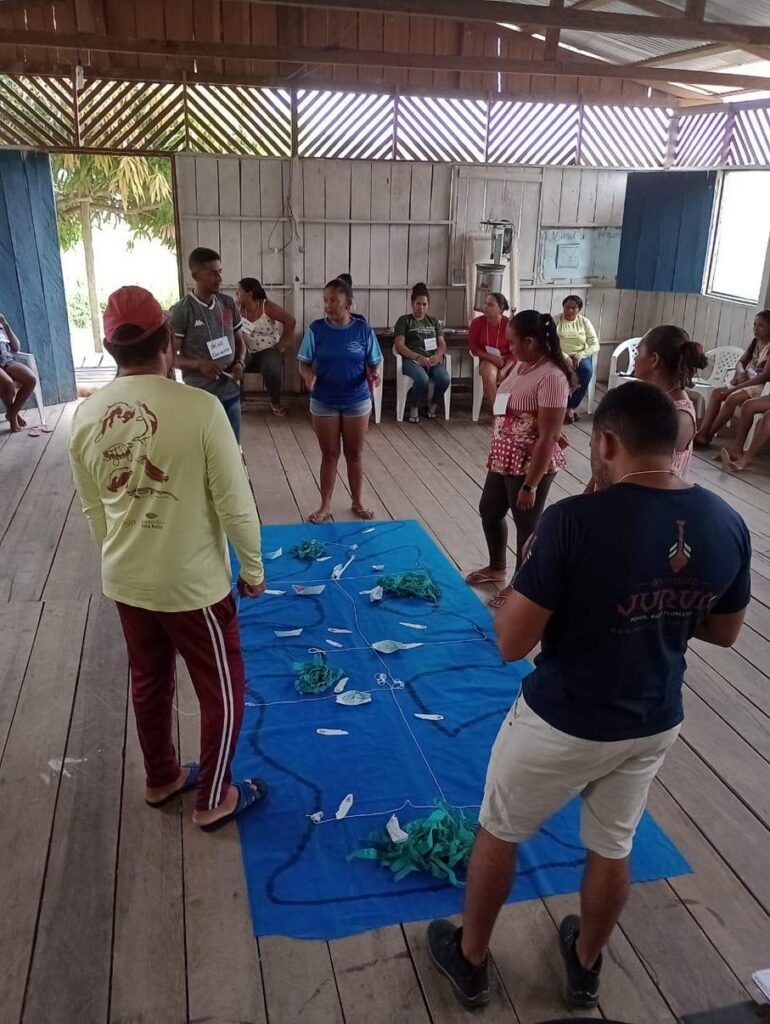
The course included theoretical classes simulating various scenery they might encounter in the environments and the best way to position themselves around the body of water to ensure accuracy in fish counting. In addition, it covers the biology of species, which is essential for enabling the counting of individuals during periods when the environments are not connected to other bodies of water, as well as understanding how biology explains the 20 minutes counting time used in the method.
The practical class is also part of the course, when the students travel to the counting area to learn how to differentiate between the juveniles (arapaimas measuring from 100 to 149 cm) and adults (arapaimas over 150 cm), they also learn how to divide the counting according to the number of counters in their teams based on the layout and size of the area.
“At first I thought I wasn’t able to do it because, in the past, it was only men who did it but when I began attending the lectures and realized it wasn’t as complicated as I thought, I started to enjoy it… and when I put it into practice I found it quite enjoyable to be there doing what I thought I would never be able to do it ”, says Ana Lúcia, a course participant who is now the youngest arapaima counter in her community, Lago Serrado.
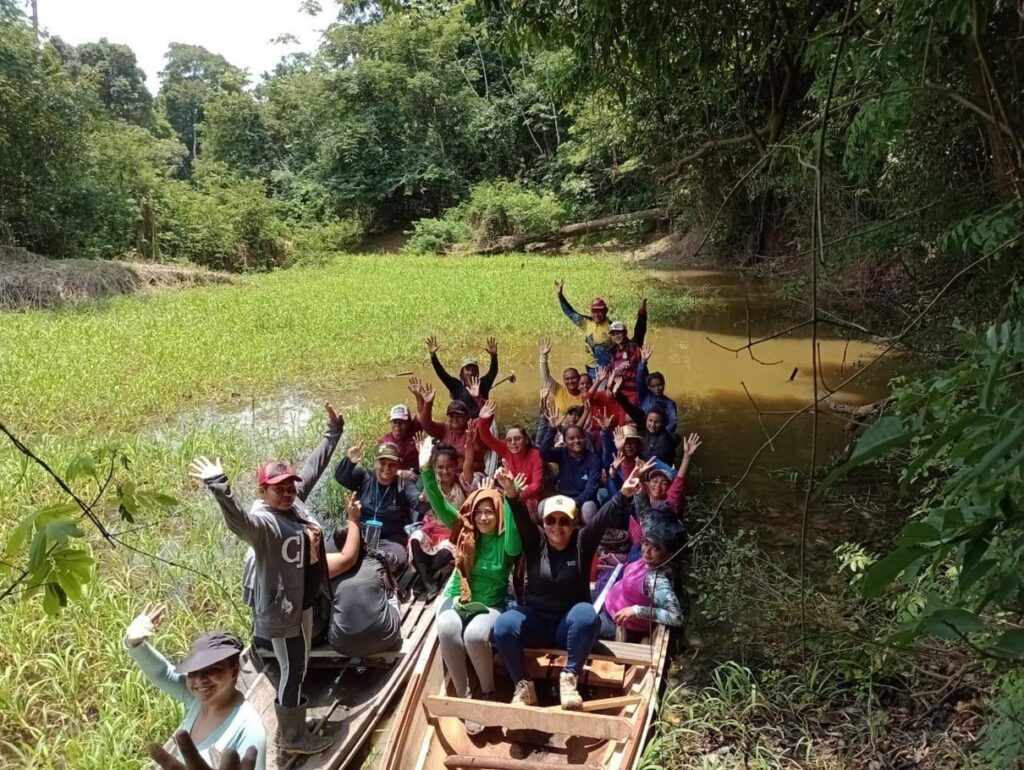
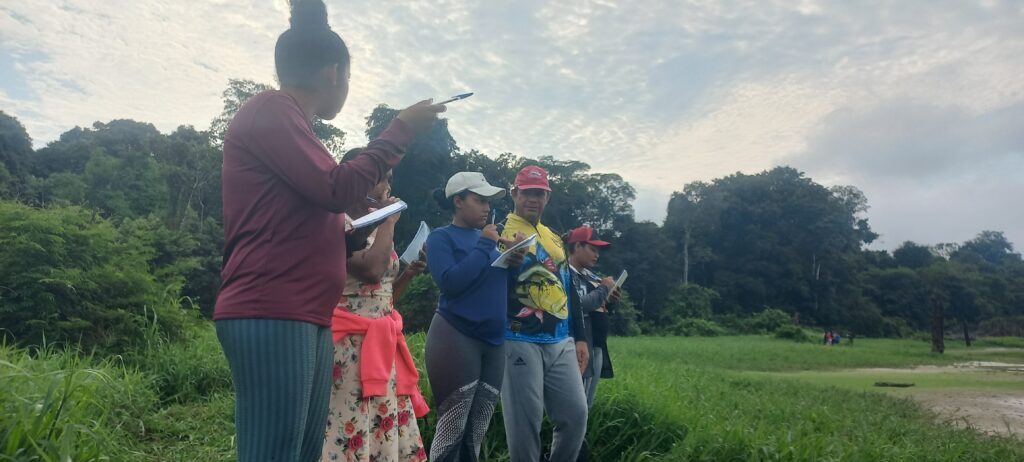
After the theoretical and practical classes, the students underwent an evaluation to test their counting abilities by comparing the accuracy with that of the certified counter. If the calculations are within the margin of error of up to 30% for underestimate or overestimate the arapaima population, the student can be approved and become a new counter, fully capable of participating in supporting the subsequent counting in their community.
The certified counter Edimar Souza is a sustainable Production Technician at Instituto Juruá and has participated in all editions of the counting course offered exclusively to women. “With this third edition in place we already have the participation of over 100 women from Mid-Juruá. These courses empower women to carry out their work on an equal footing with their husbands and other community members. The women are enhancing and developing their knowledge in the production chain of their communities. Also, the course allows people from different communities to get to know each other, and women interact in a supportive way, exchanging experiences and forming lifelong friends. ”
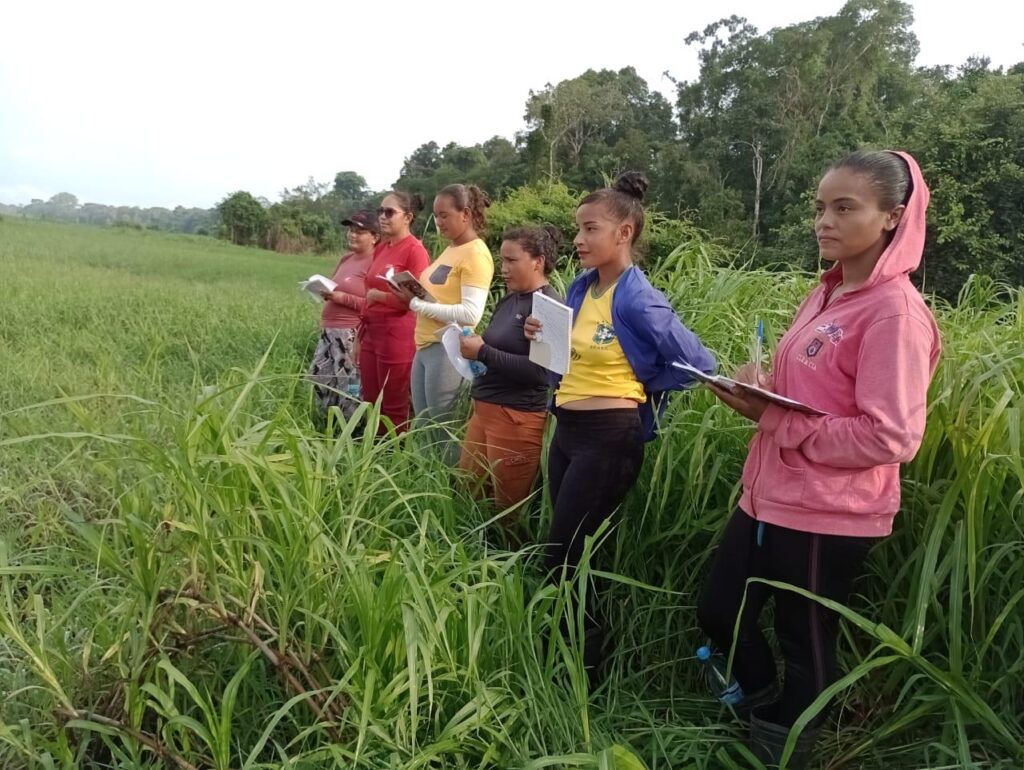
Among the 25 participants, there were residents from nine communities in the Mid-Juruá fishing agreement area, as well as representatives of the following organizations: Association of Agro Extractive Residents of the Lower Mid-Juruá (AMAB), Association of Agro Extractive Women of the Mid-Juruá (ASMAMJ), the Fishermen Colony of Carauari (COLPESCA Z-25), and the Environmental Department of Carauari.
The new counter from São João community, Rilzineide do Nascimento, is looking forward to participating in the counting stage. “I am proud that from now on I can help our community partners, gaining this experience that we didn’t have before. I think this is amazing”, adds Rilzineide.

The course concluded with the awarding of certificates for participation in this training, along with the respective performance scores indicating the counters are qualified to support counting teams in the coming years and those who need to redo the training for additional training and assessment in 2024.
The course conclusion is an important moment for the women who feel empowered and happy to be able to contribute to this stage of arapaima management and share this victory with their family, as well as taking the knowledge they have acquired back to their communities and organizations, overcoming yet another challenge imposed by the historical gender inequalities present in society.
“For all other women, I’d like to say that just because you are a woman it doesn’t mean you only have the right to stay at home cooking, doing laundry and taking care of the children. You have the right to have freedom, to do what you like and think is best”, concludes Ana Lucia.
The course is an initiative of Instituto Juruá with the association of Agro Extractive Residents of the Lower Mid-Juruá.

